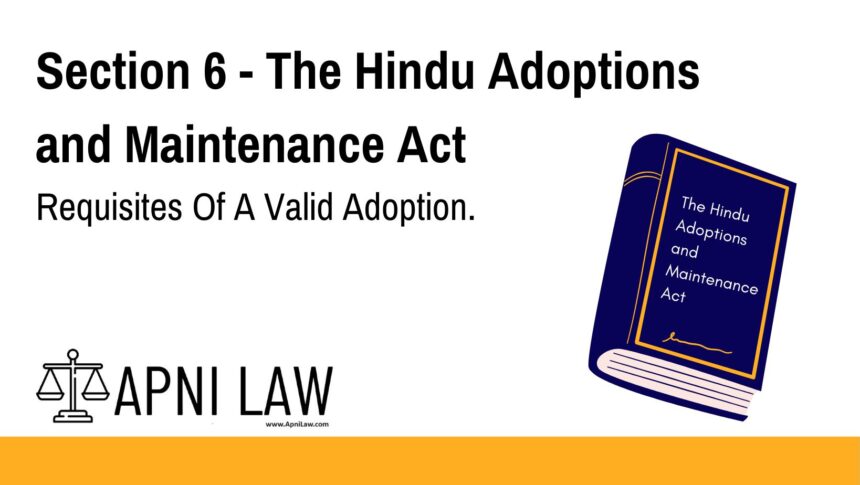Code: Section 6 – Requisites of a Valid Adoption
No adoption shall be valid unless—
(i) the person adopting has the capacity, and also the right, to take in adoption;
(ii) the person giving in adoption has the capacity to do so;
(iii) the person adopted is capable of being taken in adoption; and
(iv) the adoption is made in compliance with the other conditions mentioned in this Chapter.
Explanation of Section 6 – Requisites of a Valid Adoption
Section 6 outlines four key requirements for a valid adoption under Hindu law. If any condition is missing, the adoption becomes invalid. Therefore, understanding and meeting all four conditions is essential.
1. The Person Adopting Must Have Capacity and Right
The law allows only Hindus who are adults and of sound mind to adopt. Additionally, they must meet specific criteria defined in the Act. For example, a married man can adopt only with his wife’s consent.
2. The Person Giving the Child in Adoption Must Be Legally Authorized
Only certain individuals have the legal authority to give a child in adoption. Usually, this includes the child’s mother, father, or legal guardian. The law requires the consent of both parents unless one is deceased, of unsound mind, or has renounced the world.
3. The Child Being Adopted Must Be Eligible
Not every child can be adopted. The child must be Hindu, under 15 years old, and unmarried—unless there is a valid custom that says otherwise. Moreover, a child cannot already be legally adopted.
4. The Adoption Must Fulfill All Other Legal Conditions
In addition to the three criteria above, the adoption must follow other legal rules in Chapter II. These include rules about the gender of the adoptive child, number of adopted children, and required consents. Ignoring these rules makes the adoption void.
Illustration
Let’s look at some examples to understand how Section 6 applies:
- A 17-year-old girl tries to adopt a child. Since she is a minor, she lacks the legal capacity. Hence, the adoption is invalid.
- A man adopts a child without his wife’s consent. As consent is mandatory (unless exceptions apply), the adoption violates the law.
- A couple adopts a child who is already legally adopted by another family. This goes against eligibility rules, so the adoption is void.
- A father gives his friend’s child in adoption without any legal authority. Since he is not the parent or guardian, the adoption is not valid.
Common Questions and Answers
1. What does “capacity to adopt” mean?
It means the person must be an adult Hindu of sound mind who meets the legal criteria to adopt a child.
2. Who can give a child in adoption?
Typically, the biological parents or the child’s legal guardian can give the child in adoption. Their consent must follow the rules of the Act.
3. What makes a child eligible for adoption?
The child must be Hindu, under 15 years of age, and unmarried. The law allows exceptions only when a valid custom applies.
4. Can an adoption be valid if just one or two conditions are met?
No. All four conditions in Section 6 must be satisfied for an adoption to be valid under Hindu law.
Conclusion
Section 6 serves as the legal foundation for all valid adoptions under Hindu law. It ensures that the process respects the rights of everyone involved—the adoptive parents, the biological parents, and the child. Every Hindu adoption must meet all four legal requirements to gain recognition under the law.
To explore more about adoption procedures and legal rights under Hindu personal law, visit ApniLaw.








